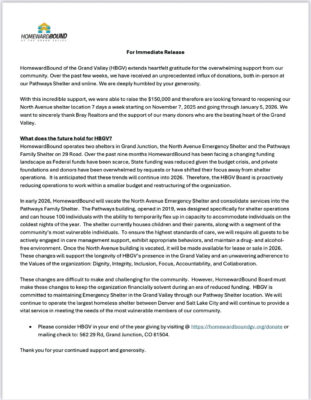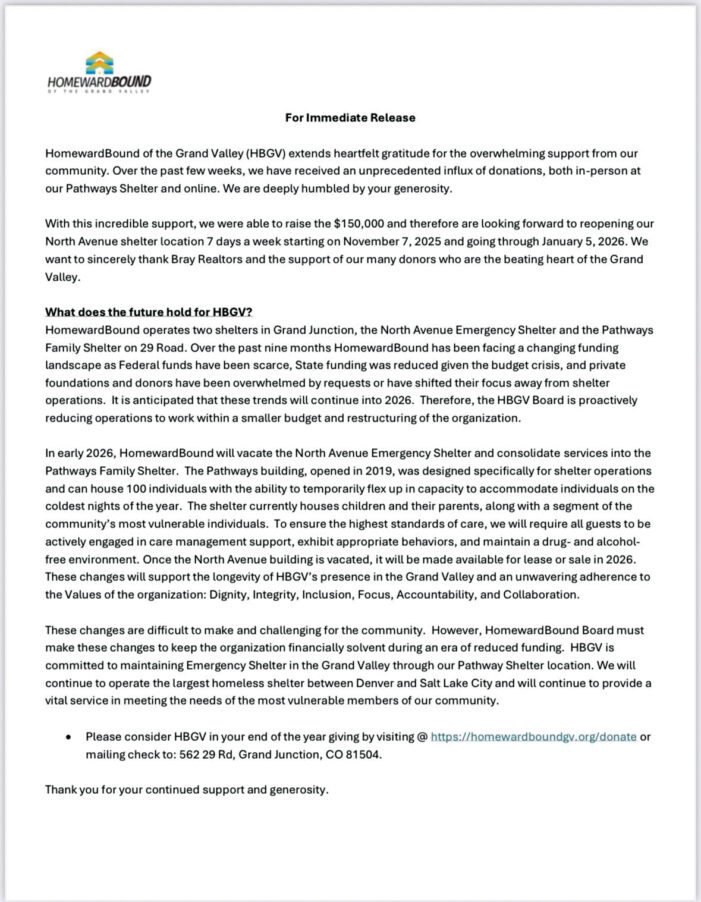Brandon Leuallen, The Business Times

As Grand Junction’s largest homeless shelter, HomewardBound of the Grand Valley, prepares to consolidate its two locations into one in January, The Business Times sat down with Joseph Center Director Mona Highline to get an in depth look at what collaboration is happening.
Highline first talked about smaller community-based programs that can shelter as many as 16 people at a time and how they will play a role in helping during the winter months. These smaller sites, often located in churches or nonprofit buildings approved under fire code and with a temporary-use permit, provide some shelter options during the winter months.
Even when HomewardBound is fully operational, the smaller programs fill critical gaps for people who might otherwise be left without shelter.
Highline said one program run by Grand Valley Peace & Justice shelters up to 16 men experiencing homelessness each night in approved church and nonprofit spaces.
The Joseph Center is also looking to partner with Grand Valley Peace & Justice to help offer similar winter shelter for women.
Highline said the idea grew out of broader discussions among local nonprofit organizations and faith-based leaders about how to fill service gaps after HomewardBound began weekend closures earlier this month.
“We’re working with the fire department right now, so we can get those 16 beds open for women,” Highline said. “That’s our goal, not just for the weekends, but also through the winter.”
“We may really need churches to open their doors again, like they used to,” she said, referencing a pre-COVID overflow program that once rotated unhoused guests between churches during the winter months. “We don’t want to see a public-health crisis on our hands.”
That overflow model ended around the start of the pandemic, according to Sherry Cole, program coordinator at Grand Valley Peace & Justice. Cole said the organization replaced it with the Winter Emergency Shelter Program, or We Shelter, which provides overnight stays for up to 16 individuals each night at approved churches and other sites.
“We take people from the streets, not just from the shelter,” Cole said. “Our guests are screened and must be drug and alcohol free. Each location is inspected and approved by the city and fire department.”
The program fills up quickly, and the nightly locations are not posted publicly, a measure taken to prevent overcapacity through walk-ins. Cole said this year’s program begins Dec. 14 and will run for three months under a temporary-use permit, rotating between churches and nonprofits that volunteer space.
“We think of ourselves as peers,” she said. “They are also participating; we’re not just doing it for them. We are helping them move forward.”
Cole said volunteers often go beyond their duties and give from their heart, such as helping a guest fix his car to attend a funeral or preparing Christmas breakfast for all participants.
“When people feel cared for, they start to see they do belong in this community,” she said.
Joseph Center’s Expanding Role
For nearly a decade, the Joseph Center has developed a network of programs aimed at helping people move from homelessness to independence.
Highline said the Family Center supports unhoused pregnant women, families and domestic-violence survivors with life-skills training and case management.
The Golden Girls Project offers transitional shelter for women 50 and older, with nine residents permanently housed this year and a waiting list for its 15 beds.
The Integrated Financial Services Program manages Social Security and VA benefits for clients across 15 counties, maintaining a 98 percent success rate in keeping them stably housed.
The Joseph Center’s Day Shelter and Services provide meals, computer access and help with job searches and housing applications, needs that have grown since HomewardBound’s weekend closures.
“We have a big cowbell out there, so when anybody gets a house or a job or whatever, they have to ring the bell,” Highline said. “Then the whole building stops, and everybody cheers.”
Highline said the Joseph Center doesn’t just help the homeless; it also helps what she calls “The Working Poor” to move through struggles and into a better place in life. She gave an example of one client who was able to buy a house, because the center was able to help the person utilize an insurance plan that the client didn’t know how to use at the time.
“The Joseph Center isn’t just a day shelter feeding people and singing kumbaya,” she said. “We’re helping families get back on their feet, paying bills, managing money, connecting them with caseworkers and helping them stay housed.”
She said many staff members are former clients.
“All of our programs are designed to move people forward,” she said. “It’s not a handout. It’s about stability, recovery and hope.”
Collaboration and Compassion
Although HomewardBound is shutting down its North Avenue shelter and consolidating it with Pathways Family Shelter, Highline said collaboration among local nonprofits has been growing to find ways to meet the needs.
“I’ve been in this valley 37 years, and I’m very impressed with how we’re rallying together,” she said. “We all want the same thing, to make sure no one freezes out there.”

